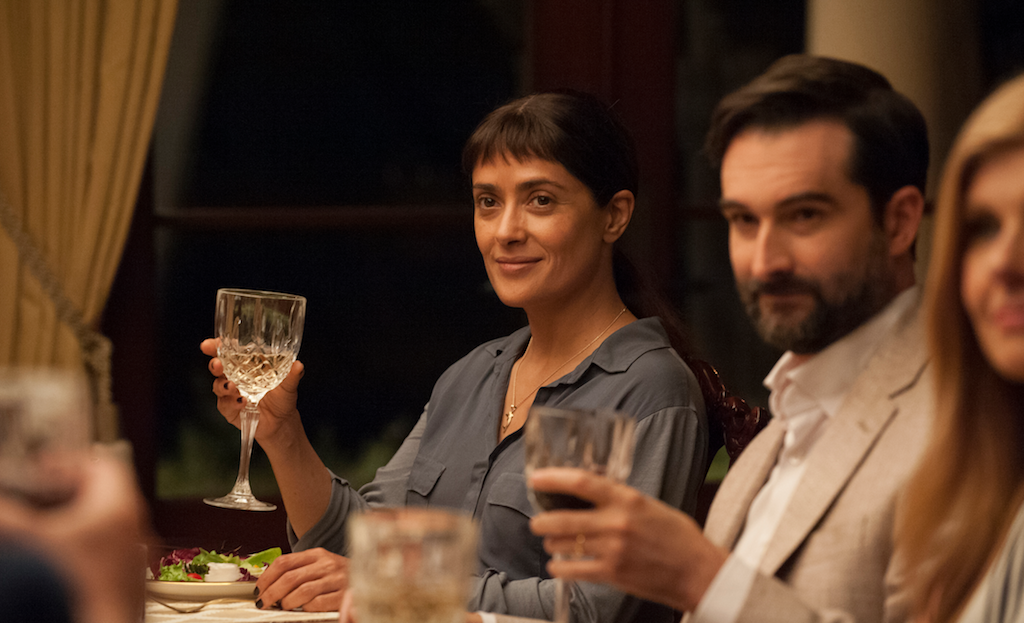
How are we supposed to feel about Beatriz (Salma Hayek), the protagonist of Miguel Arteta’s Beatriz at Dinner? It’s clear she’s supposed to be a good person—a healer (she does massage for cancer patients), an empath who reads other people and instantly absorbs their thoughts and pain, a lover of all God’s creatures, including her pet goats. But is she also supposed to be . . . annoying and self-righteous?
Since Beatriz at Dinner was written by Mike White, who gave us the deliciously uncomfortable Chuck and Buck, I’ll assume the squirm-factor was baked into the cake. There are some who will undoubtedly see Beatriz as a working class hero. I saw her more as a really bad dinner guest.
The set up: After leaving the cancer center where she works, Beatriz drives to a Los Angeles hills mansion where she gives a massage to longtime client Cathy (Connie Britton), who’s getting ready for a big dinner party. Cathy and her husband Grant (David Warshofsky) are hosting his boss, a big-shot, famous businessman named Doug Strutt (John Lithgow) and his wife (Amy Landecker), as well as an ambitious young colleague (Jay Duplass) and his wife (Chloë Sevigny). But when Beatriz goes to leave, her car won’t start and Cathy asks her to stay for dinner. It’s an ill-advised bit of noblesse oblige. Cathy should know that this dinner party, where everyone will be sucking up to Doug, drinking heavily, and talking shop, would be extremely unwelcoming to any outsider, let alone a modest and earthy Mexican woman.
At first, everything goes as we might expect: The guests are merry and vulgar in their confidence, their casual displays of superficiality and wealth, and Beatriz hangs back, feeling sheepish and shy. Inevitably, Doug mistakes her for the help.
But then something unexpected happens—first at dinner, where Beatriz doesn’t yield the floor to Doug, as everyone else has, but tells her own story of a fishing trip with her father. Later, she finds out that Doug is a big game hunter and she throws a phone at him. After doing some research, she discovers that Doug has made his money by developing preserved wild land and kicking poor people out of their homes. He’s a monster and she loathes him.
Lithgow is particularly great here. It’s easy to say that his Doug is a Donald Trump type, except he’s much more shrewd than that. He’s amused, to a point, by Beatriz’s hatred of him, and he has no guilt, no conscience—he’s already convinced himself that the only reason he’s successful is because he has the balls to get the job done where lesser men do not.
Sporting unflattering short bangs and drab attire, Hayek is wonderful, too—her still, watchful gaze regarding her fellow dinner guests first with keen interest and eventually contempt. She’s a wolf in sheep’s clothing. That being said, I was a little troubled by the idea it was a Mexican woman who was so full of spiritual energy and healing powers—it felt a bit pandering, an Hispanic take on the dreaded “Magic Negro” archetype. Likewise, the film’s judgment of the wealthy dinner guests felt overly facile and obvious. Yes, the guests are shallow and greedy. But it’s Beatriz who’s violating the social contract, not them. At one point, Cathy essentially sends Beatriz to her room and I felt a sense of relief—hoping she wouldn’t ruin the party any more.
There’s a part of me that admires Beatriz at Dinner. It made me deeply uncomfortable, which not many films can do. It made me question my own reaction to it. I can’t quite say I enjoyed it, but I’m not going to forget it that easily, either.
